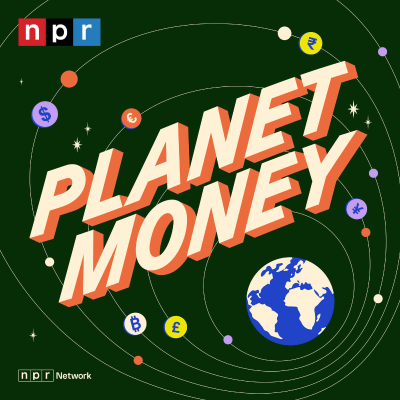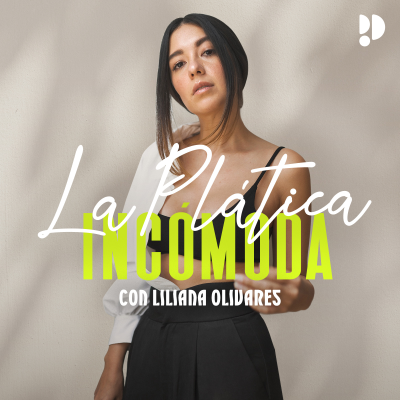
Planet Money
inglés
Negocios
Empieza 7 días de prueba
$99 / mes después de la prueba.Cancela cuando quieras.
- 20 horas de audiolibros al mes
- Podcasts solo en Podimo
- Podcast gratuitos
Acerca de Planet Money
Wanna see a trick? Give us any topic and we can tie it back to the economy. At Planet Money, we explore the forces that shape our lives and bring you along for the ride. Don't just understand the economy – understand the world.Wanna go deeper? Subscribe to Planet Money+ and get sponsor-free episodes of Planet Money, The Indicator, and Planet Money Summer School. Plus access to bonus content. It's a new way to support the show you love. Learn more at plus.npr.org/planetmoney
Todos los episodios
1341 episodiosThe Supreme Court struck down a bunch of Trump's tariffs. Now what?
Live event info and tickets here. [https://tix.to/pm-book-tour] The Supreme Court has spoken. Those big, sweeping tariffs that President Trump imposed early last year? They’re illegal. On today’s show: Why were those tariffs struck down? Will anyone get refunds? And …what about this new 10 percent tariff the President just announced today? Plus — a growing market for tariff refunds. Further Listening: - Worst. Tariffs. Ever. [https://www.npr.org/2024/12/11/1218506684/worst-tariffs-ever-update] - Tariffs: What are they good for? [https://www.npr.org/2025/04/02/1242229719/planet-money-the-case-for-tariffs] - What "Made in China" actually means [https://www.npr.org/2025/05/07/1249592921/tariff-customs-made-in-america-china-france] - The 145% tariff already did its damage [https://www.npr.org/2025/05/16/1251782092/tariff-us-china-pause-trade-war] - Are Trump's tariffs legal? [https://www.npr.org/2025/06/11/1253992700/tariffs-ieepa-trump-legal-emergencies-law] - Days of our Tariffs [https://www.npr.org/2025/11/19/nx-s1-5608384/tariffs-consumers-shipping-shopping-prices] - Trump's backup options for tariffs [https://www.npr.org/2025/11/12/nx-s1-5605545/trumps-backup-options-for-tariffs] - What would it mean to actually refund the tariffs? [https://www.npr.org/2025/12/02/nx-s1-5627159/what-would-it-mean-to-actually-refund-the-tariffs] Pre-order the Planet Money book and get a free gift [https://www.planetmoneybook.com/]. / Subscribe to Planet Money+ [https://n.pr/3HlREPz] Listen free: Apple Podcasts [http://n.pr/PM-digital], Spotify [https://n.pr/3gTkQlR], the NPR app [https://n.pr/3Bkb17W] or anywhere you get podcasts. Facebook [https://n.pr/3h92GwS] / Instagram [https://n.pr/3FqLuws] / TikTok [https://n.pr/3sGZdrq] / Our weekly Newsletter [https://n.pr/3zrFvUB]. This episode was hosted by Jeff Guo, Mary Childs, and Sarah Gonzalez. It was produced by Sam Yellowhorse Kesler and Willa Rubin. It was edited by Marianne McCune. It was fact-checked by Sierra Juarez. Alex Goldmark is Planet Money’s executive producer. Learn more about sponsor message choices: podcastchoices.com/adchoices [https://podcastchoices.com/adchoices] NPR Privacy Policy [https://www.npr.org/about-npr/179878450/privacy-policy]
How to get what Greenland has, with permission
Book tour and ticket info here. [https://tix.to/pm-book-tour] Greenland has said it is not for sale. Denmark has said it can’t even legally sell Greenland. And at a security conference in Munich over the weekend, U.S. lawmakers spent a lot of time trying to walk back some of President Trump’s recent threats to try to buy, or even take over, the territory. But whether Trump can or will or should try to control or purchase a territory that doesn’t want to be sold is not the interesting question. What is interesting is how we got to this moment. And, how we might gracefully get out of it. Greenland is valuable for its minerals and because of its physical location in the world. (It’s easy to keep an eye on other countries from Greenland). Our latest: How the U.S. dropped the ball on the rare earths race. And one way the U.S. gets strategic locations without threatening to buy or take over an entire territory. Further listening: - Is Greenland really an untapped land of riches? [https://www.npr.org/2026/01/21/nx-s1-5683139/is-greenland-really-an-untapped-land-of-riches] - Add to cart: Greenland [https://www.npr.org/2025/01/21/1225890655/add-to-cart-greenland] Pre-order the Planet Money book and get a free gift [https://www.planetmoneybook.com/]. / Subscribe to Planet Money+ [https://n.pr/3HlREPz] Listen free: Apple Podcasts [http://n.pr/PM-digital], Spotify [https://n.pr/3gTkQlR], the NPR app [https://n.pr/3Bkb17W] or anywhere you get podcasts. Facebook [https://n.pr/3h92GwS] / Instagram [https://n.pr/3FqLuws] / TikTok [https://n.pr/3sGZdrq] / Our weekly Newsletter [https://n.pr/3zrFvUB]. This episode was produced by Willa Rubin with help from Sam Yellowhorse Kesler. It was edited by Marianne McCune. Fact-checking help from Sierra Juarez. It was engineered by Kwesi Lee and Robert Rodriguez. Alex Goldmark is our executive producer. Music: Universal Music Production - "The Attraction,” “Carnivore,” and “Walls Come Out.” Learn more about sponsor message choices: podcastchoices.com/adchoices [https://podcastchoices.com/adchoices] NPR Privacy Policy [https://www.npr.org/about-npr/179878450/privacy-policy]
Betty Boop, Excel Olympics, Penny-isms: Our 2026 Valentines
Book tour event details and ticket info here [https://tix.to/pm-book-tour]. An iconic cartoon character liberated from copyright, journalism from the world of competitive spreadsheeting, a controversial piece of US currency. Each year the Planet Money team dedicates an episode to the things we simply love and think you, our audience, will also love. In this year’s Valentine’s Day episode: * The Public Domain Day list [https://web.law.duke.edu/cspd/publicdomainday/2026/] from Jennifer Jenkins’ of Duke’s Center for the Study of the Public Domain and her colleagues. * Jesse Dougherty’s article “Between the sheets at the college Excel Championship” which is behind a paywall. Here is Jesse’s substack [https://collegesportsmoney.substack.com/]. * 404 Media’s excellent journalism [https://www.404media.co/elite-the-palantir-app-ice-uses-to-find-neighborhoods-to-raid/] on the tech that ICE is using * An ode to the language of the penny, including songs like Pennies from Heaven [https://www.youtube.com/watch?v=vnz_gbDJnhI]. * The only self-check out that doesn’t waste your time. * And we made public domain Valentine’s cards. Download THE OFFICIAL Planet Money valentine here [https://www.dropbox.com/scl/fi/w5jcio1w98okftefdxk3z/Official-Planet-Money-Valentine-2026.pdf?rlkey=8vbbras56o6jigkvmftfvia1b&st=jte9em3s&dl=0]. Pre-order the Planet Money book and get a free gift [https://www.planetmoneybook.com/]. / Subscribe to Planet Money+ [https://n.pr/3HlREPz] Listen free: Apple Podcasts [http://n.pr/PM-digital], Spotify [https://n.pr/3gTkQlR], the NPR app [https://n.pr/3Bkb17W] or anywhere you get podcasts. Facebook [https://n.pr/3h92GwS] / Instagram [https://n.pr/3FqLuws] / TikTok [https://n.pr/3sGZdrq] / Our weekly Newsletter [https://n.pr/3zrFvUB]. This episode of Planet Money was hosted by Kenny Malone. It was produced by James Sneed with help from Sam Yellowhorse Kesler, fact-checked by Sierra Juarez, engineered by Cena Loffredo & Kwesi Lee, and edited by our executive producer Alex Goldmark. Learn more about sponsor message choices: podcastchoices.com/adchoices [https://podcastchoices.com/adchoices] NPR Privacy Policy [https://www.npr.org/about-npr/179878450/privacy-policy]
The Invention Invention
Book tour tickets and details here [https://tix.to/pm-book-tour]. Today, the story of three inventions. The first, the sewing machine, was created by a selfish and ambitious inventor who wanted all the credit and was willing to fight a war for it. The second, a more modern invention, was made by an Italian inventor who wanted only to connect the world through video, so “evvvvverybody can talk with evvvvverybody else.” And, a third invention that tied them both together across more than a century. The patent pool. How do people get motivated to invent, and how do they get rewarded for their ideas? Usually through a patent. And, when the thicket of patents becomes too thick, how do we simplify, and make it so inventors can work together? The answer will involve bitter rivals, a sewing machine war, the nine no-no’s of anti-trust, and something called a gob-feeder. Subscribe to Planet Money+ [https://n.pr/3HlREPz] Listen free: Apple Podcasts [http://n.pr/PM-digital], Spotify [https://n.pr/3gTkQlR], the NPR app [https://n.pr/3Bkb17W] or anywhere you get podcasts. Facebook [https://n.pr/3h92GwS] / Instagram [https://n.pr/3FqLuws] / TikTok [https://n.pr/3sGZdrq] / Our weekly Newsletter [https://n.pr/3zrFvUB]. This episode was hosted by Erika Beras and Sam Yellowhorse Kesler. It was produced by Luis Gallo and edited by Marianne McCune. It was fact-checked by Sierra Juarez and engineered by Cena Loffredo. Alex Goldmark is Planet Money's executive producer. Learn more about sponsor message choices: podcastchoices.com/adchoices [https://podcastchoices.com/adchoices] NPR Privacy Policy [https://www.npr.org/about-npr/179878450/privacy-policy]
Iran, protests, and sanctions
Book tour tickets and details here [https://tix.to/pm-book-tour]. The recent protests in Iran are about so many things. Human rights, corruption, freedom. But this time – they are also motivated by economic hardship. Hardship caused, in part, by US sanctions. The US has been sanctioning Iran in one way or another for 47 years. But sanctions, as a tool, only work some of the time, and US sanctions on Iran have not always conformed to what experts consider best practices. On today’s episode: What did US sanctions do to Iran's economy? How did they feed into the latest protests and crackdown in Iran? Sanctions are supposed to avert war, but how different from war are they? To learn more about the protests in Iran and the country’s history, check out our great friends at Throughline: Iran Protests Explained [https://www.npr.org/2026/01/22/nx-s1-5684033/iran-2026-protests] Iran and the U.S., Part One: Four Days In August [https://www.npr.org/2019/07/10/740510559/four-days-in-august] Iran and the U.S., Part Two: Rules of Engagement [https://www.npr.org/2019/07/17/742712613/rules-of-engagement] Iran and the U.S., Part Three: Soleimani’s Iran [https://www.npr.org/2025/06/25/1269528041/iran-and-the-u-s-part-three-soleimanis-iran] Subscribe to Planet Money+ [https://n.pr/3HlREPz] Listen free: Apple Podcasts [http://n.pr/PM-digital], Spotify [https://n.pr/3gTkQlR], the NPR app [https://n.pr/3Bkb17W] or anywhere you get podcasts. Facebook [https://n.pr/3h92GwS] / Instagram [https://n.pr/3FqLuws] / TikTok [https://n.pr/3sGZdrq] / Our weekly Newsletter [https://n.pr/3zrFvUB]. This episode was hosted by Mary Childs and Nick Fountain. It was produced by James Sneed with help from Willa Rubin. It was edited by Marianne McCune, fact-checked by Sierra Juarez, and engineered by Cena Loffredo and Jimmy Keeley. Planet Money’s executive producer is Alex Goldmark. Learn more about sponsor message choices: podcastchoices.com/adchoices [https://podcastchoices.com/adchoices] NPR Privacy Policy [https://www.npr.org/about-npr/179878450/privacy-policy]
Elige tu suscripción
Premium
20 horas de audiolibros
Podcasts solo en Podimo
Podcast gratuitos
Cancela cuando quieras
Empieza 7 días de prueba
Después $99 / mes
Empieza 7 días de prueba. $99 / mes después de la prueba. Cancela cuando quieras.





































